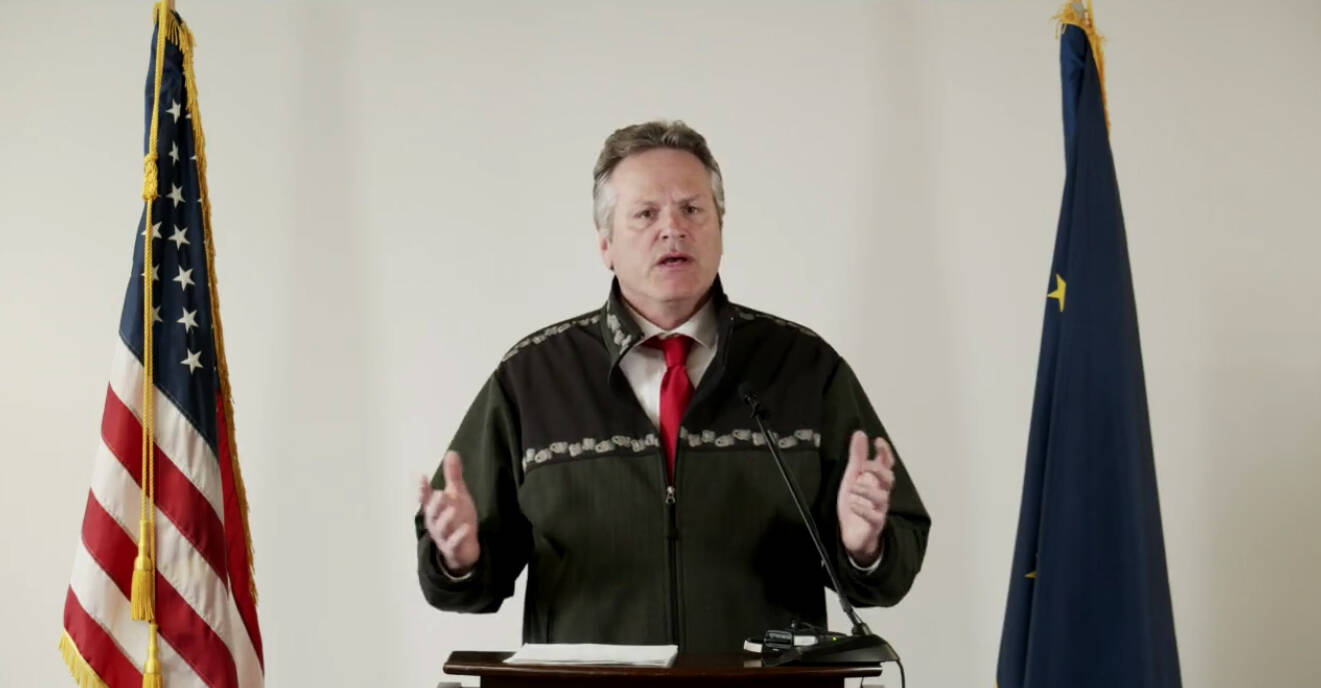Alaska Gov. Mike Dunleavy announced new legislation Wednesday to expand health care capacity by contracting health care professionals from the Lower 48 to aid Alaska’s COVID-19 front-line workers.
This comes as Alaska has been reporting the highest number of COVID cases per capita in the nation this week, rolling in at 117 per 100,000 people on Wednesday, according to New York Times data.
“As a society goes about its business, there’s definitely an emergency occurring in the hospitals,” Dunleavy said during the Wednesday press briefing. “A lot of folks are getting burned out, so we have people leaving the health care industry.”
The state reported a total of 213 COVID hospitalizations on Wednesday, not including people seeking care for other injuries or ailments. Central Peninsula Hospital in Soldotna was operating at 122% capacity Wednesday morning — 21 of the 49 regularly licensed beds occupied by COVID patients.
The governor said during the press conference that while he believes the COVID vaccine should be a choice each Alaskan makes individually, his administration is continuing to encourage people to get the jab.
“The vaccinations remain the most important tool that we have,” Dunleavy said. “Vaccinations are available — we have ample supply and anyone (12 and older) can get a vaccination that so chooses.”
But in the meantime, to help hospitals struggling with overcapacity and burnout, 470 contracted health care professionals are making their way to Anchorage from the Lower 48 next week.
Heidi Hedberg, the state director of public health, said there are 297 registered nurses, 114 certified nursing assistants and patient care technicians, 15 respiratory therapists, 14 medical lab personnel, 12 surgical technicians, 11 social workers, two licensed practical nurses and one physician on the way.
The health care professionals are contracted through DLH Solutions — a federal health and human service outsourcing organization — and will be in Alaska for a minimum of 90 days, with an option for additional extension.
The program, Hedberg said, costs $87 million and is 100% reimbursable by the Federal Emergency Management Agency (FEMA).
“We’re incredibly thankful that there is a federal public health emergency (relief), and we’re thankful because FEMA will reimburse that contract,” she said.
Mobile integrated health care will also be used under the new program for people in Fairbanks, the Matanuska-Susitna Borough, Juneau, Anchorage and Kenai. The mobile system allows health care professionals to arrive on-scene to a patient to triage the individual and use telemedicine to consult with physicians.
“They are looking at how to leverage mobile integrated health care in order to help decompress the hospitals from the front end to the back end,” Hedberg said.
Chief Medical Officer Dr. Anne Zink presented context to the statewide hospitalization rates during the press conference Wednesday, saying that Alaska has never seen more COVID illness and death than what the state is currently experiencing.
“I think we all wish the pandemic was over, and we have all experienced this pandemic in different ways,” she said. “But we are also at the worst place in the pandemic that we’ve had this entire time.”
Zink said to put the case load in perspective, out of 1,000 new cases, health care officials would expect 600 of them to get severely ill. Of the 600, she said approximately 260 of them would be children, 23 would be hospitalized and five would die.
She also emphasized that hospitals are still seeing the vast majority of severe COVID cases in unvaccinated individuals.
“The average age of a person who is currently hospitalized with COVID-19 who’s unvaccinated is 15 years younger than someone who was vaccinated,” Zink said. “People continue to underestimate the risk of COVID-19 and overestimate the risk of vaccination, resulting in more people getting sick.”
Since January, Zink said 90% of COVID cases and 92% of COVID hospitalizations have occured in unvaccinated people.
“Acting now is critical to relieve the pressure on the hospitals, but also because (in) total, it will affect the cumulative number of people who get sick,” Zink said. “Kindness and compassion are important to all, especially to our health care workers who are committed to providing care to all Alaskans.”
Dunleavy said the politicization of the pandemic has been “unfortunate,” and that Alaskans should rely on science and health care professionals when making personal health decisions.
“I think everyone agrees that we have a pandemic; I think everyone agrees that we do have a virus,” he said. “The question is how do we deal with it? Politicizing it is just making it worse, it’s making decisions difficult for folks. (In) some respects, it’s tearing apart our society.”
Dunleavy reiterated that officials at the Department of Health and Social Services are not politicians, but that they present policymakers with pertinent COVID data.
“(Health officials), they’re not politicians,” he said. “I want them to focus on the health care of our state … and they’ve done a phenomenal job.”
Dunleavy emphasized that he doesn’t “believe mandates work well” and that Alaskans need to decide to vaccinate for themselves.
“Alaskans should seriously consider getting the vaccination if they have not,” he said. “I don’t think it’s necessary to twist arms. What I think is necessary is that we don’t politicize this pandemic anymore. … We’re going to get assistance but that doesn’t mean that individual Alaskans should not or cannot help themselves.”
Zink reiterated that it will not just take health care providers, but also policymakers, the public and the press to manage the pandemic.
“As we know, this is not something that we do on our own,” she said. “No pandemic lasts forever, and it’s going to take all of us to change this course.”
Reach reporter Camille Botello at camille.botello@peninsulaclarion.com.

